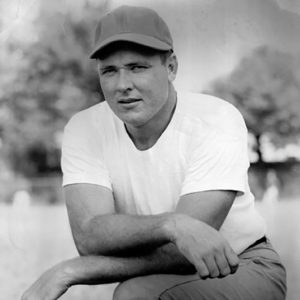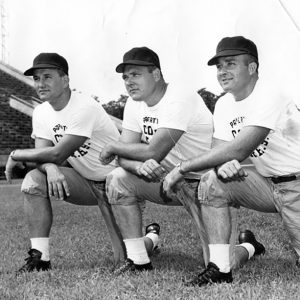calsfoundation@cals.org
Wilson David Matthews (1921–2002)
Wilson Matthews was a legendary Arkansas high school and university football coach and administrator. In his eleven years as head coach at Little Rock High School (later renamed Little Rock Central High School) in Little Rock (Pulaski County), his teams won ten state championships. He later joined the staff of coach Frank Broyles at the University of Arkansas (UA) in Fayetteville (Washington County). As assistant coach there, he participated in the successful Razorback football program and later moved to administrative duties in the athletic department. He served at UA for over forty years, retiring as associate athletic director.
Wilson David Matthews was born on July 18, 1921, in Atkins (Pope County) to Andy O. Matthews and Ester Sproles Matthews. In June 1947, he married Martha Lou Gauldin. They had three sons: David, Scott, and Bruce.
Matthews attended Atkins High School, where he played football and was twice selected All-State. He played in 1940 and 1941 at Arkansas Polytechnic College (now Arkansas Tech University) in Russellville (Pope County). He was both quarterback and linebacker, and was an All-Conference honoree both years. He moved to the UA and played in 1942 under coach George Cole. In 1943, Matthews was drafted for military service and assigned to the V-12 Program at Monticello A&M College (now the University of Arkansas at Monticello), where he played with the Monticello Marine-Navy football team.
After leaving military service, he began his coaching career in the 1944 season as the football coach at Rogers High School in Rogers (Benton County). After one season with a team record of 7–3, he left to be an assistant at Little Rock High School under coach Raymond Burnett, his former high school coach. When Burnett left to be head coach at Arkansas Tech, Matthews was named Little Rock High School head coach in 1947.
Playing both in-state and out-of-state schools, his first four teams had records of 12–0–1, 9–1–1, 10–1, and 10–2. The 1951 team had a record of 9–3 with two losses to in-state teams by a total of three points, and a loss of the state championship. For the next six years, his teams did not lose to an in-state opponent. The 1956 and 1957 teams were undefeated. Matthews left after the 1957 season with thirty-three consecutive wins. His record at Little Rock was 111–14–3 (87 percent). The 1957 team was declared the national champion.
As coach, Matthews was noted for discipline and his temper. His players were said to have feared and respected him, but never to have doubted him. “Fear and revere,” as one player put it. His high school teams began each game expecting to win. At Little Rock High School, occasionally a police car would visit the practice field to report that neighbors were complaining about the loud and inappropriate language of the coach. After one out-of-state game, when the bus returned to the school on Sunday afternoon, he made the team practice. Despite having won the game, he did not like the way they had played. Matthews once said that he thought most teams had about the same level of talent, but conditioning and teamwork made the difference.
On some occasions, Matthews initiated obtaining football scholarships for players who could not afford college, and he assisted players in other ways in their personal lives. Regarding the 1957 desegregation of Central High, Matthews issued an ultimatum to his players that anyone involved in any kind of disruption would be expelled from the team.
The alumni of his Little Rock High School football teams not only took pride in having played for him but developed a longtime camaraderie. They formed the “Wilson’s Tigers” group, which had annual dinner meetings that Matthews attended. The group was active into the early decades of the twenty-first century.
Matthews had once applied for the open head coaching position at the University of Arkansas but was deemed to be too young. When Frank Broyles was later hired as head coach and offered Matthews a position, he accepted in January 1958. At UA, he coached defensive ends and linebackers before taking on administrative duties in 1969. He continued coaching freshmen until being named assistant athletic director in 1973, after which he concentrated on administrative duties. During his tenure, the Razorbacks were named the national champion in 1964 by a five-member committee of the Football Writers Association of America and played in eight bowl games. He declined opportunities to serve as head coach at other colleges. He also earned both bachelor’s and master’s degrees in education at UA.
He was noted for two innovations at the university. He established an off-season conditioning program that was dreaded by the players but contributed to better performance. He also initiated a priority seating system that brought increased fan contributions to the Razorback Foundation, which funds much of the athletic program. Broyles said of Matthews, “He was instrumental in helping elevate fan support around the state from a healthy enthusiasm to an unbridled passion for the Razorbacks.” Broyles also said, “I never made a decision regarding the future of our program without asking Wilson for his input.” Matthews was associate athletic director when he retired in 1992.
Among his career honors were induction into the Arkansas Sports Hall of Fame, the Razorback Hall of Honor, the Arkansas Tech Hall of Distinction, and the Arkansas High School Coaches Hall of Fame, and he was named a Distinguished American by the Arkansas Chapter of the National Football Foundation and Hall of Fame.
The Broyles Award is an annual award given to honor the best assistant coach in college football. First awarded in 1996, it was named after UA men’s athletic director Frank Broyles. The Broyles Award Trophy, made out of solid bronze, depicts Broyles (kneeling) and an assistant coach (standing), watching over a Razorbacks game. Broyles selected the one assistant he wanted to have depicted looking over his shoulder on the winner’s trophy: Wilson Matthews.
Matthews was honored on one of twelve plaques located under the scoreboard at the north end of Reynolds Stadium in Fayetteville dedicated to supporters of the Razorback sports program.
Matthews died on May 13, 2002.
For additional information:
Cain, Scott. “Wilson Matthews 1921-2002 Yes, Sir, They Loved Him.” Arkansas Democrat-Gazette, May 14, 2002, pp. 1C, 6C.
Caldwell, Steven. “Matthews Nearing End of a Legendary Career.” Arkansas Democrat, June 18, 1989, p. 7C
Cate, George. The Good Ground of Central High: Little Rock Central High School and Legendary Coach Wilson Matthews. Little Rock: Butler Center Books, 2008.
“Matthews Served Arkansas as Coach, Administrator.” ESPN Classic, May 13, 2022. http://www.espn.com/classic/obit/s/2002/0513/1381946.html (accessed December 22, 2022).
W. W. Satterfield
Little Rock, Arkansas
 Recreation and Sports
Recreation and Sports World War II through the Faubus Era, 1941 through 1967
World War II through the Faubus Era, 1941 through 1967 Wilson D. Matthews
Wilson D. Matthews  Wilson D. Matthews
Wilson D. Matthews 



Comments
No comments on this entry yet.